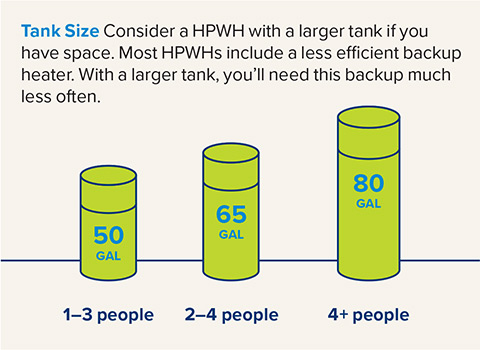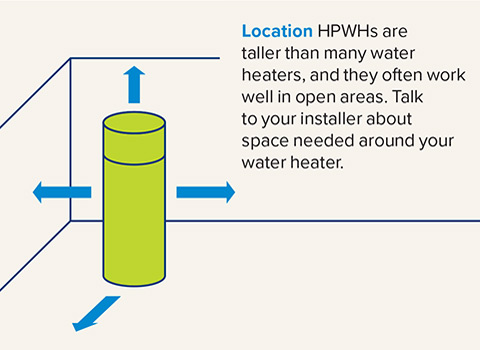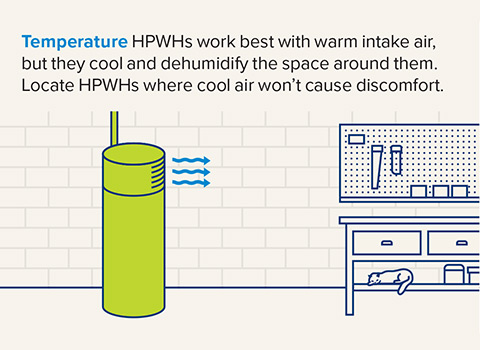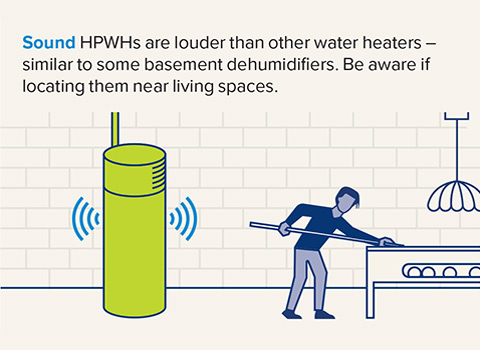Water heating is typically the second-largest energy expense in a home – adding up to approximately $400-$600 each year for the average household. Properly maintaining your water heater and choosing high-efficiency equipment can help you save energy, improve the comfort of your home, and contribute to a cleaner environment.
There are several options for water heaters. However, heat pump water heaters (HPWHs) ![]() are one of the best options currently available to consumers. This ultra-efficient technology is also eligible for Inflation Reduction Act (IRA) tax credits, NYS Clean Heat rebates
are one of the best options currently available to consumers. This ultra-efficient technology is also eligible for Inflation Reduction Act (IRA) tax credits, NYS Clean Heat rebates ![]() , and low-interest financing. Income-eligible New Yorkers may qualify for IRA rebates through the EmPower+ program to install a HPWH.
, and low-interest financing. Income-eligible New Yorkers may qualify for IRA rebates through the EmPower+ program to install a HPWH.
Heat Pump Water Heaters
HPWHs are a highly efficient way to heat water, using electricity to pull heat from the surrounding air and transfer it to water enclosed in a tank. These water heaters are up to three times more efficient than conventional electric resistance water heaters because they use electricity to move heat from one place to another instead of generating heat directly.
HPWHs will lower your energy use while reducing your carbon footprint.
Benefits
- Efficient, uses one third the energy of most water heaters
- Healthy and safe, with no fuels, no carbon monoxide risk
- Affordable, with rebates and low operating costs
- Sustainable, with low greenhouse gas emissions
- Widely available from plumbers and large retail stores
- Long-lived, with warranties up to 10 years
- Relatively simple to install, without major disruptions
- Acts as a dehumidifier, drawing moisture from immediate surroundings
- Incentives, rebates, and tax credits, check with NYS Clean Heat
 , your installer, and your tax advisor
, your installer, and your tax advisor
Size and Location Considerations
- Size of the unit


Information About Unit Size Information About Unit Size
Tank Size
Consider a HPWH with a larger tank if you have space. Most HPWHs include a less efficient backup heater. With a larger tank, you'll need this backup much less often.
- 50 gal: 1-3 people
- 56 gal: 2-4 people
- 80 gal: 4+ people
- Its location


Information About Location Information About Location
Location
HPWHs are taller than many water heaters and they often work well in open areas. Talk to your installer about space needed around your water heater.
- Air temperature around the unit


Information About Air Temperature Around the Unit Information About Air Temperature Around the Unit
Temperature
HPWHs work best with warm intake air but they cool and dehumidify the space around them. Locate HPWHs where cool air won't cause discomfort.
- Noisier than conventional water heaters


Information About Sound Information About Sound
Sound
HPWHs are louder than other water heaters -- similar to some basement dehumidifiers. Be aware if locating them near living spaces.
- Air filters require cleaning and replacement
Cost Considerations
Cost Considerations
Hot water costs will likely decrease – sometimes significantly – compared to conventional gas, propane, oil, and electric water heaters. If you previously heated with fuel, don’t be surprised to see electric bills rise. Your gas, oil, or propane bills will drop.
If a HPWH doesn't work in your space, there are other efficient, all-electric options to consider.
Other Options
Electric Storage Water Heater
This is a conventional storage water heater. It consists of an insulated tank in which water is electrically heated then stored until needed.
Benefits:
- Low upfront cost
- 10-15 -year life expectancy
- Widely available in a range of sizes
Considerations:
- Use more energy than other water heaters
- Energy can be wasted to keep water in heated to a set temperature
- Can have higher operating and maintenance costs compared to other water heaters
Electric Tankless / On-Demand
Tankless water heaters provide hot water only as needed without a storage tank. They use intense flashes of heat against water-filled coils.
Benefits:
- Can use less energy than a storage water heater, depending on user’s behaviors
- Provide a constant supply of hot water
- Can be placed on a wall or under a counter to free up floor space
- Require less space than traditional water heaters
- Have a life expectancy of about 20 years
Considerations:
- Can have a higher upfront cost than storage water heaters
- Limited flow rate of hot water means simultaneous, multiple uses of hot water can stretch the unit to its limits
- May require installing more than one to ensure continuous hot water
Solar Water Heaters
Solar water heaters rely on solar energy to generate heat. This type of heater requires two parts: a solar collector and an insulated storage tank. These heaters typically have a backup source of energy for days with minimal sun.
Benefits:
- Can meet almost 100 percent of a home’s hot water needs during warmer months, depending on the weather and exposure to sun
- Significantly more efficient than storage water heaters, resulting in lower energy bills
- Require infrequent professional maintenance
- Approximate 20-year life span
- Use renewable energy, which contributes to a cleaner environment
Considerations:
- Can have a higher upfront cost than conventional and heat pump water heaters
- May require a backup for cloudy days, cold winters, and times of high demand
- Solar collectors must be kept free of debris or snow, for optimal efficiency
- Maintenance is infrequent, but must be performed by a qualified solar contractor
